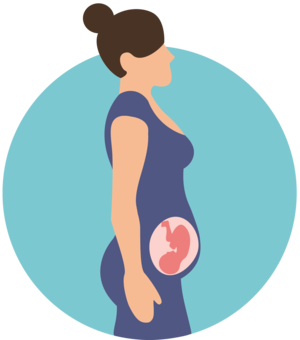Pregnancy at week 28
4-minute read
Your baby
Your baby now measures about 37cm from the top of their head to their toes, and weighs about 1kg. Their body is now in proportion with their head and their face has filled out, so they look more like a normal baby.
They are putting on weight rapidly and have less room to move around. They may be in the breech position at this stage, with their head up and their bottom down. Don’t worry though - most babies will move into the head-down position by the time they are born.
Your baby's heartbeat can be heard through a stethoscope, and your partner might even be able to hear it by putting their ear to your tummy, although it’s difficult to find the right place.
Their lungs have developed enough for them to breathe outside the uterus – although they would probably need some help. If they were born now, your baby would have a good chance of surviving, although there would still be a high risk of disability.
Your baby at 28 weeks
| Length: | 25cm (head to bottom) |
| Weight: | 1kg |

Your body
Congratulations - you have reached the third trimester! As the birth gets nearer, you will probably start seeing your doctor or midwife for antenatal appointments every 2 weeks.
Many women find things get more uncomfortable in their third trimester. You might have back pain and leg cramps, indigestion and heartburn, and your hands and feet might get quite swollen. It’s a good idea to take off any tight jewellery and put your feet up as often as you can.
You should sleep on your side as your pregnancy progresses, especially from 28 weeks. Lying on your back puts pressure on major blood vessels. This can reduce the flow of blood to your womb, and restrict your baby’s oxygen supply. Research has shown that sleeping on your side can reduce the risk of stillbirth by half.
Things to remember
If your blood is Rhesus (Rh) negative, you will need to have an injection now to protect your baby against Rhesus disease. If you are Rh-negative and your baby is Rh-positive, then you can produce antibodies that attack the baby’s blood. This can make them very sick. It can be prevented by having an injection called the anti-D injection. You need this injection now and then again at your 34 to 36 week check-up.
If you haven’t had it already, you may also be offered a Glucose Tolerance test to check whether you have gestational diabetes at 28 weeks.
Read next

Your pregnancy at 29 weeks
Learn about your pregnancy journey and what is happening to you and your baby.

Speak to a maternal child health nurse
Call Pregnancy, Birth and Baby to speak to a maternal child health nurse on 1800 882 436 or video call. Available 7am to midnight (AET), 7 days a week.
Learn more here about the development and quality assurance of healthdirect content.
Last reviewed: April 2022



